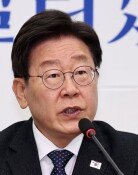Sloppy patchwork of election bill disregarding voters
Sloppy patchwork of election bill disregarding voters
Posted December. 21, 2019 08:35,
Updated December. 21, 2019 08:35
Negotiations for a new election bill that were spearheaded by “four + one” parties excluding the main opposition Liberty Korea Party have effectively collapsed. The five political groups had agreed to the idea of applying a 50 percent rate of linkage to 30 of the 50 proportional representation seats at stake, but the talks collapsed as the ruling party rejected the system allowing candidates to concurrently run for both regional representation seat and proportional seat and thus granting election win to those candidates who “narrowly lost the election” despite garnering more popular votes among such candidate. In the wake of failure in the talks over the Election Bill, the ruling party demanded that the five parties first deliberate on the bill on the establishment of a special investigation office for crimes committed by top ranking officials, but the smaller opposition parties refuted the demand. If these parties fail to find a breakthrough, they will have no chance to get the Election Bill passed by the parliament by year’s end. The parties are thus shamelessly engaged in dog fight in their desperate strife to win at least one more parliamentary seat through the council of “four + one” parties, which has no legal ground whatsoever.
The system allowing candidates to run for both regional representation seat and proportional representation seat is designed to rescue candidates who narrowly lost the election in their constituencies. The measure was partly aimed at easing regional confrontation between the Gyeongsang and Jeolla provinces in the past. While the original purpose has weakened, the measure has also been criticized as a political plot used by veteran lawmakers belonging to smaller opposition parties to win a proportional representation seat when they lost in the election for a regional representation seat. Shim Sang-jeong, chairman of the liberal Justice Party, strongly blasted the system as being ‘insurance for big name politicians’ in the past, but completely changed her rhetoric this time around.
The ruling party, which agreed to the system under the coalition of “four + one” parties in April, has changed its stance and argument in light of its own political interest. The decision was reportedly affected by an analysis suggesting that if a Justice Party candidate completes his or her campaign through the election in order to benefit from the system in the tight race in the Greater Seoul region, votes in support of the broader opposition camp will be scattered. For this reason, ruling party candidates mostly from the Greater Seoul region strongly objected to the system. As the general elections draw nearer, the ruling party has lost interest in common novel cause, and become more interested in garnering just one more vote.
The council of “four + one” parties has been blasted by critics as a secretive political deal between the ruling party, which desperately seek to get the bill on the establishment of a special investigation office for top civil servants passed by the parliament the soonest possible, and smaller opposition parties that are making all-in bet in the negotiations over the election bill. As they have failed to narrow differences in their interests, the election bill has become a sloppy patchwork comprising three totally different institutions, namely “local constituency + proportional representation seats based on the list of political party members + proportional representation seats of linkage.” The Liberty Korea Party has warned that if this bill is railroaded by the five parties, it will separately create a “Proportional Korea Party” aimed only at garnering extra proportional representation seats. As such, satellite parties targeting proportional representation seats are poised to emerge en masse.
The Election System should be something that can be easily understood by any ordinary citizen. While trying to create such a puzzle-like election bill, a leader of a minority party once effectively claimed, “Not all people need to know the formula for this system,” and we wonder whether those opposition parties are moving to hold vote only to sever their own interests. If this is what they want, it is not reform but deform.







